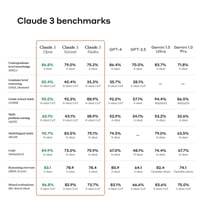Even with the over-hype and rather dim buzz about ChatBots, they're more than just novel. They're...
The Shift from Search Engines to Answer Engines: SEO is dead. Long live AEO.

In the past six months, I've drastically changed how I search for information. Instead of using traditional search engines like Google, I've been relying on AI-powered tools like ChatGPT and Meta's LLaMA. This shift has not only made my life simpler but also significantly boosted my efficiency, from writing and research to generating code sequences and even responding to emails.
Why the Switch?
Traditional search engines like Google and Bing are evolving, but they're still primarily designed to retrieve and index information from the web. This method often requires users to sift through numerous links to find the relevant answers. In contrast, answer engines leverage AI to understand the context and nuances of full-sentence queries, providing direct, concise answers without the need for extensive searching (blog.google) (MarketMuse Blog).
The Rise of Answer Engines
-
Improved User Experience: Answer engines utilize natural language processing (NLP) to understand user queries more deeply, making it easier to get specific answers quickly. This shift is part of a broader trend towards more intuitive, human-like interactions with technology (GovLoop).
-
Efficiency and Accuracy: By focusing on the intent behind queries, answer engines can deliver more accurate and relevant responses. This is especially beneficial for complex questions that would otherwise require scanning through multiple web pages (Search Engine Journal).
-
Content Optimization: For businesses, this means adapting to a new kind of SEO—Answer Engine Optimization (AEO). This involves structuring content to directly answer questions, enhancing visibility in AI-driven search results (MarketMuse Blog).
Trust in Generative AI
Another significant trend is the shift in trust from authoritative sources to generative AI tools. Users are increasingly relying on AI like ChatGPT for everything from research to content creation. This is largely due to the personalized and context-aware responses these tools provide, which can feel more immediate and relevant than traditional search results (Search Engine Land).
Personal Experience
Over the past half-year, I've found that using ChatGPT and LLaMA has streamlined many aspects of my work. Whether it's drafting LinkedIn outlines for the articles I write, generating code snippets, or even handling emails, these AI tools have become invaluable personal assistants. They help me stay organized and focused, allowing me to manage my time more effectively.
Ensuring Non-Biased Information
As users increasingly turn to AI-powered tools for their information needs, ensuring the accuracy and impartiality of these tools becomes crucial. Here are some key considerations:
-
Awareness of Bias: It's essential to be aware that AI tools, like any other information source, can have biases. These biases can stem from the data they were trained on or intentional fine-tuning by vendors to favor certain products or viewpoints (Search Engine Journal).
-
Choosing Trusted Sources: When selecting an AI tool, opt for those with transparent training data and unbiased algorithms. This transparency helps ensure that the information provided is accurate and free from hidden agendas (Search Engine Land).
-
Regular Updates and Audits: AI tools should be regularly updated and audited to maintain accuracy and impartiality. Users should look for tools that are open about their update schedules and audit processes (GovLoop).
-
Vendor Transparency: Be cautious of AI tools provided by vendors with a vested interest in promoting their products. Tools like Microsoft's Copilot, integrated into various Office applications, may prioritize Microsoft's ecosystem, potentially skewing the information towards their products and services (MarketMuse Blog).
The Future of Search and Information Retrieval
As we move forward, the integration of AI in search and information retrieval will likely continue to grow. Here are some trends to watch:
-
Increased Adoption of AI Tools: More people and businesses will adopt AI tools for everyday tasks, from research and writing to customer service and data analysis (Search Engine Land) (Search Engine Journal).
-
Advancements in Natural Language Processing (NLP): Continued improvements in NLP will make AI tools even more effective at understanding and responding to complex queries (GovLoop).
-
Enhanced User Experience: The focus will shift towards creating more intuitive and user-friendly interfaces for AI tools, making them accessible to a broader audience (blog.google).
Final Thoughts
The transition to AI-powered answer engines represents a profound change in how we access and interact with information. For those of us who have embraced these tools, the benefits are clear: greater efficiency, personalized interactions, and enhanced productivity. As these technologies continue to evolve, they will undoubtedly play an even more significant role in our personal and professional lives.
Call to Action
Have you made the switch to AI-powered answer engines? Share your experiences and thoughts in the comments below. Let's explore how these tools are shaping the future of information retrieval together!
Relevant Hashtags and Mentions
#AI #AnswerEngines #ChatGPT #LLaMA #AEO #SearchEngineOptimization #GenerativeAI #Productivity #TechInnovation
@GaryVee @elonmusk @SatyaNadella @SundarPichai @microsoft @google @meta
By staying informed and adaptable, we can leverage the power of AI to enhance our efficiency and stay ahead in a rapidly changing digital world.
.png?width=1375&height=286&name=GenerativeIntelligent%20Business%20Process%20Automation%20(1).png)
.%20The%20image%20should%20feature%20a%20brain%20symbol%20connected%20to%20a.webp?height=200&name=DALL%C2%B7E%202024-08-27%2013.46.47%20-%20A%20simple%20and%20minimalist%20image%20representing%20the%20concept%20of%20Retrieval-Augmented%20Generation%20(RAG).%20The%20image%20should%20feature%20a%20brain%20symbol%20connected%20to%20a.webp)
%20being%20helped%20out%20of%20a%20deep%2c%20dark%20hole%20by%20another%20man%20(Sam)%20who%20is%20standing%20at%20the%20edge%20of%20the-1.webp?height=200&name=DALL%C2%B7E%202024-06-11%2008.37.41%20-%20A%20simple%20yet%20impactful%20illustration%20showing%20a%20man%20(John)%20being%20helped%20out%20of%20a%20deep%2c%20dark%20hole%20by%20another%20man%20(Sam)%20who%20is%20standing%20at%20the%20edge%20of%20the-1.webp)
